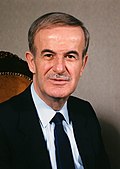| |||||||||||||||||||||||||
All 250 seats in the Parliament of Syria 126 seats needed for a majority | |||||||||||||||||||||||||
|---|---|---|---|---|---|---|---|---|---|---|---|---|---|---|---|---|---|---|---|---|---|---|---|---|---|
| Registered | 6,576,907 | ||||||||||||||||||||||||
| Turnout | 49.64% | ||||||||||||||||||||||||
| |||||||||||||||||||||||||
| |||||||||||||||||||||||||
 |
|---|
|
Parliamentary elections were held in Syria on 22 and 23 May 1990. [1] No political parties were permitted outside the National Progressive Front, though candidates outside this group could run as independents. Approximately 9,000 candidates ran as independents. [2] Members were elected using the multiple non-transferable vote in fifteen districts, with an average district magnitude of 16.6. [3] The result was a victory for the Ba'ath Party, which won 134 of the 250 seats. [4] Voter turnout was 49.6%.

